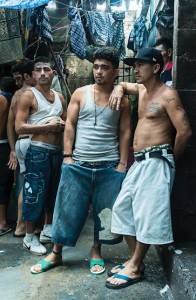
The Salvadoran state has closed off all possibility of any kind of negotiation with the gangs. The constitutional court’s August ruling states that gang members will be considered as terrorists under Salvadoran law. The ruling also affects the thousands of people who work with the gangs, all the way from family members to taxi drivers.
With no communication whatsoever with the gangs and their followers, or mediators, the Salvadoran authorities are seeking to find ways to address the problem of violence that has led to homicide rates higher than those during the armed conflict of the 80s, which left 75,000 dead.
The ruling by the highest judicial authority of the country represents a dramatic turn from the policies of the Funes administration, which supported a truce between the gangs. The truce was established in March of 2012, and drastically reduced the rates of homicide and violence in the country. Today, El Salvador has become the most violent nation in Latin America.
The ruling states, “Terrorism consists of the organized and systematic exercise of violence, concretely affecting legal, individual and collective property. In general, terrorism seeks to intimidate the population, control territories, compel the governmental authorities to negotiate penitentiary or other concessions, affect the economic system of a country, the institutional framework of democracy and the system of fundamental rights that are referred to in the constitution.”
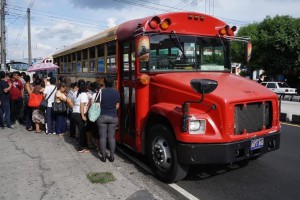
Several weeks before this ruling was issued, government authorities and the General Prosecutor’s Office accused gangs of orchestrating actions against the public transportation system that aimed to paralyze the country and put pressure on the government to accede to a dialogue with the gang leaders. Gang leaders want better prison conditions and a return to minimum-security prisons, after being transported to the country’s maximum-security prison, known as “Zacatraz.”
On July 27, a group of managers from 44 public transportation lines that circulate in San Salvador staged a work stoppage because they had supposedly received threats from gang members to their employees. The manager Roberto Soriano told the Americas Program that one of his employees communicated to him that gang members had come to his office to tell him about the work stoppage.
“It was handled like a rumor. On Sunday they told us that the gangs told the motorists and bus drivers about the threats. We informed the police, but we didn’t make a complaint,” explained Soriano.
The supposed threats came to the managers on Sunday. On Monday, at four in the morning, a motorist was killed, which caused the rumors to spread. On Aug. 7, seven public transit drivers were killed. The police stated that they have not proved that the killings were related to the threats made to public transit.
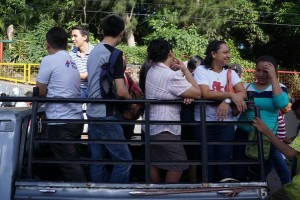
“This is not new and we’ve been facing this situation for several weeks. The threats were received by a few companies whose zone of influence is clearly identified as high-risk, but we are investigating,” said the director of the National Civil Police (PNC), Mauricio Ramírez Landaverde, at a press conference.
Thousands of Salvadorans walked several kilometers to get to their jobs and some private vehicles charged a dollar per person to make trips to the capital. Eugenio Chicas, secretary of communications of the president, assured that the sabotage to public transport by gangs had been brought under control thanks to intelligence work on the part of state institutions.
“The transport workers have not stopped work because of grievances. Rather, what’s going on is a terrorist sabotage of public transit. It has not affected the government, but the population,” said the functionary in a press conference.
The government alleged that Carlos Eduardo Burgos Nuila and José Hernández Mauricio, members of the Barrio 18 gang (18th Street gang) were responsible for paralyzing public transportation and for the deaths of the seven bus drivers.
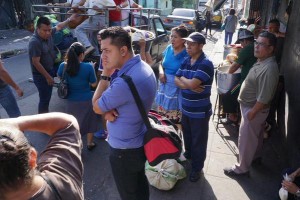
In less than two days the police and the Attorney General’s office named another 10 members of the Barrio 18 gang for being in charge of intimidating bus drivers. The Salvadoran authorities stated that subjects distributed fliers with the threats. But some of the people who were arrested ended up free hours later due to a lack of evidence, while others are still waiting to be tried.
With the ruling of the Supreme Court, the gangs have ceased to be seen as groups of misunderstood, marginalized young people, and are converted into the worst enemy of the Salvadoran state. The Salvadoran state is looking to the experiences of other countries, such as Colombia, to find out how to curb the actions of the gangs and dismantle their systems, which, according to the Salvadoran authorities, are also connected to drug trafficking in the region.
Since May of 2015, homicide rates in the small country, which has an area of a little more than 21 thousand square kilometers, similar to the US state of Massachusetts, are breaking records. The chief prosecutor predicts that this year could become the most violent of the last ten years.
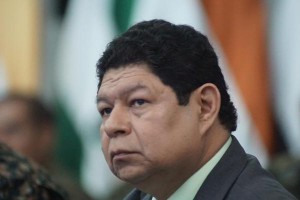
When the gangs declared a truce in March of 2012, the homicide rate descended to five murders a day. In August, the rate is hovering around 51 homicides a day. The Minister of Security, Benito Lara, places responsibility on the gangs that are behind the crimes in the country, and also stated that the majority of victims are gang members.
“The criminals want to make the impression that they are coercing the government. That is not the case. A large majority of the dead are gang members. These groups are in an internal conflict over the changing of the guard and control of territory,” said Minister Lara in a interview with the Americas Program.
Despite the court ruling, there are sectors of the country that believe that it is necessary to listen to the gang members and open up dialogue to control the violence and reduce murders in the country.
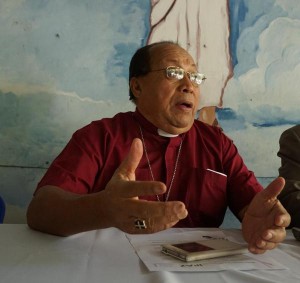
Representatives from the Lutheran and Anglican churches denounce the situation of violence in the country, and insist on dialogue as key to preventing more murders.
“We advocate based on the pastoral work that we do as churches. The killings and other acts of violence worry us and that is why we think there should be a dialogue. We think that dialogue is the only road to peace,” Lutheran bishop Medardo Gómez said to the Americas Program.
Carmen Rodriguez is a reporter in San Salvador who works with the Americas Program. www.americas.org/es
Photos by John Sevigny
Translation by Simon Schatzberg



